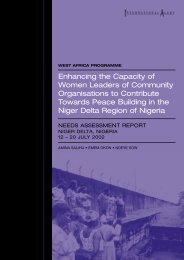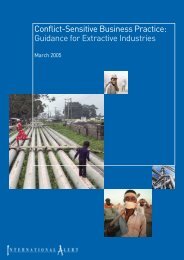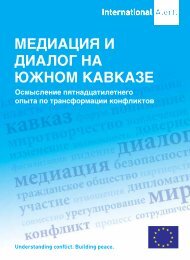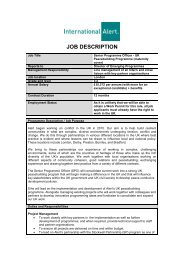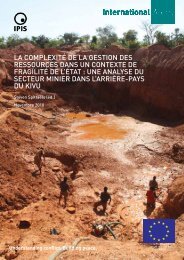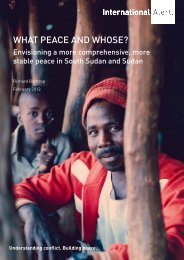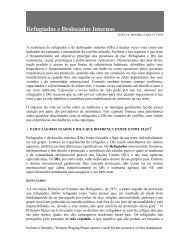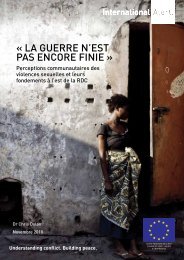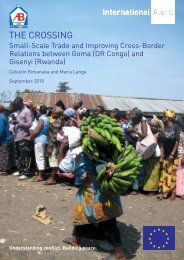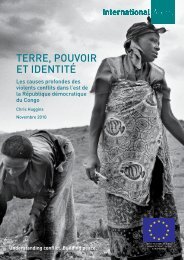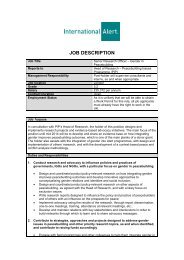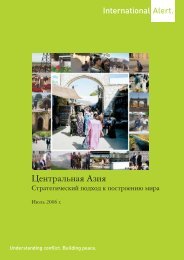42 • Women’s Bodies as a Battleground: Sexual Violence Against Women and Girls During the War in the Democratic Republic of Congobefore sending them to a dispensary. They provide clothes and soap for victims who have been strippedof their possessions, and offer shelter in refuges for women who find themselves homeless as a result ofbeing stigmatised. They also organise monitoring visits for those women whom it has not been possibleto accommodate in the refuges. Despite the excellent work that they do, these organisations, small innumber, have neither sufficient financial means nor the appropriate expertise to give these patients thekind of treatment and special care they need.In this situation, many of the women interviewed had no alternative but to look after themselves, withintheir very modest means. 13.4% of the informants had relied on self-medication with common basicmedicines such as aspirin or bactrim. For 42% of them, living in remote rural communities, bathing anddouching with the use of local medicinal plants helped to slightly ease the pain. In 91.6% of cases, thewomen simply washed themselves in plain tepid water.Sometimes families gave moral support. This was the case for 32.5% of the victims, who werenevertheless urged by their families not to make public what had happened to them, to avoid beingstigmatised by their friends or by the community as a whole. Of the women in the sample, 49.6% hadbeen supported by their mothers, who gave them advice and supplied remedies to ease the pain. A smallpercentage of the women also received the support of their husbands: in 7.1% of the cases, the husbandstook a close interest in the treatment their wives received and gave them moral support.6.1.2 Psycho-social consequences of the rapesAlmost all (91%) of the interviewees claimed they were suffering from behavioural problems. The mostfrequently cited were latent fear and shame but they also mentioned self-loathing, excessive sweating,insomnia, nightmares, memory loss, aggression, anxiety, sense of dread, and withdrawal into themselves.These are all symptomatic of the deep trauma that most of the informants were suffering. A substantialnumber of them were tormented by the fear of having contracted HIV/AIDS or other sexually transmitteddiseases. Many of the women were suffering from dyspareunia (85.6%), feelings of disgust about sex, andlibido problems (37.2%), or severe pain in the lower abdomen (79.4%) had found it difficult to have anuntroubled sex life again. For them, sexual relations had become a real nightmare.Many women blamed themselves for what happened to them. This feeling was made worse by theirexperience of being stigmatised and ostracised by their families and by their communities, who hold themresponsible for the sexual violence they endured. This stigmatisation, together with the fear of contractingHIV was one of the main reasons why most of the victims’ husbands had either shunned them or left themaltogether. Some even demanded that their wives provide a medical certificate declaring that they wereHIV-negative before starting to live together again. The screening test is expensive and the women, manyof whom are extremely poor, usually cannot afford to have it done. This situation has led to numerousdivorces. In Fizi and Uvira districts, for example, 26% of the married women who had been victims ofrape had been abandoned by their husbands, most of whom had then remarried.The problem is most acute for single girls and young women. Infection or even the suspicion of being HIVpositive considerably reduces their chances of getting married. Given the health and socio-economicsituation in DRC their chances of having children, or of having children with a life expectancy of morethan five years, are also reduced. All this adds up to a grim picture for the women who are single and hasa profound effect on their mental equilibrium – especially in a country like the DRC where encouraginga high birth rate remains deeply entrenched in its culture. Women who have suffered sexual violence andwho as a result will not be able to fulfil the reproductive role that society assigns to them often findthemselves judged for it.The ostracism and stigmatisation are even worse when rape results in pregnancy. Women and girls whofound themselves pregnant as a result of being raped represent 6% of the sample. They regard theirunwanted pregnancies – together with HIV infection – as one of the most serious consequences of rape.On a psychological level, the child they are carrying is the living and permanent symbol of the rape they
43 • Women’s Bodies as a Battleground: Sexual Violence Against Women and Girls During the War in the Democratic Republic of Congowere subjected to. This is an unbearable situation to be in, particularly since families and communitiesvery often blame the women themselves for it. The pregnancies cause arguments between couples, andvery few husbands accept children who are not theirs. One interviewee who was in this kind ofsituation declared:“… the baby himself is innocent but my husband doesn’t even want to touch him. Hehas told me to wean the baby as soon as possible and give him to my mother to lookafter, if I want to be forgiven. The presence of the child rekindles his anger and meanshis feelings cannot be healed…”Divorce among these couples is common - 36%. The women’s immediate family, their in-laws and thewhole community regard these babies conceived through rape as an affront - a bad memory left by theattackers and above all as a future threat to the community, because, they say, these children resembletheir fathers. One woman heard someone saying about her son:“… it’s a little snake in the grass, sooner or later it will bite…”One girl from Shabunda who, together with her mother, had spent two years as a sex slave in a Maï Maïcamp and had given birth to a child before being freed, said:“… when we returned, we were well received by our family, but the neighbours sneeredat us. The presence of this child in the family is not accepted. My uncles were talkingamong themselves saying that this is a Maï Maï child, unruly and brutal like its father.The child is almost naked, like the Maï Maï were at the start, when their movementwas formed.”These children are therefore subject to terrible social pressure. They are commonly referred to as “mutotowa haramu,” 57 Interahamwe or Maï Maï – depending on which group the man or men who raped theirmothers belonged to.Women who are forced to divorce after being raped have little chance of remarrying. The same goes forunmarried girls, who not only lose their fiancés, if they have one, but also subsequently have enormousdifficulty in finding another partner. Often the husbands’ families adopt a very hard attitude towards theirdaughters-in-law or sisters-in-law who have been raped, particularly in cases where the husband wasmurdered during the attack. These women are then held responsible for the loss of a member of the family.Many of the women who are raped end up losing all confidence and self-esteem. Some fall intoprostitution. Others have broken away from their community to find refuge in places where they cannotbe identified. In Bushwira and Kabare, for example, almost all the women who became pregnant as aresult of rape had left home to lose themselves in the anonymity of urban centres such as Uvira, Bukavuor Goma.Unfortunately, stigmatisation encourages a culture of silence. Women opt to conceal what has happenedto them rather than face the censure of their family and community. Among Pygmy women, who wereraped en masse around the area of the Kahuzi-Biega national park, only 36% dared to inform theirspouses; 9% told no one about what had happened to them, and the others told only a member of theirfamily: sister, mother, brother or father. Out of the husbands who were told, 47% reacted very badly,becoming suspicious of their wives and 26% showed compassion, supported their wives and shared theirsecret. At Fizi, 63% of the women interviewed had never told anybody.Sexual violence perpetrated against women has led to dysfunction within the family unit, which in somecases is no longer in a position to play the role of guardian of moral and ethical values. Children andyoung people who witnessed the rape of their mother or sister, or who were forced to commit incest have57.Bastard in Kiswahili.



